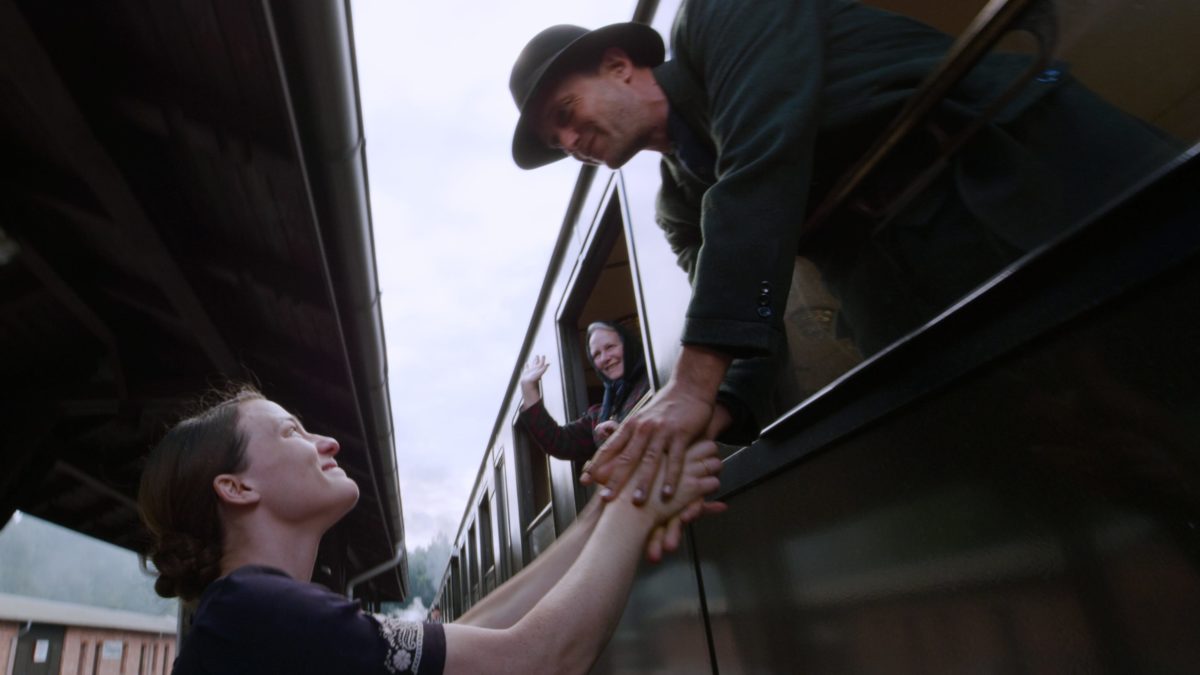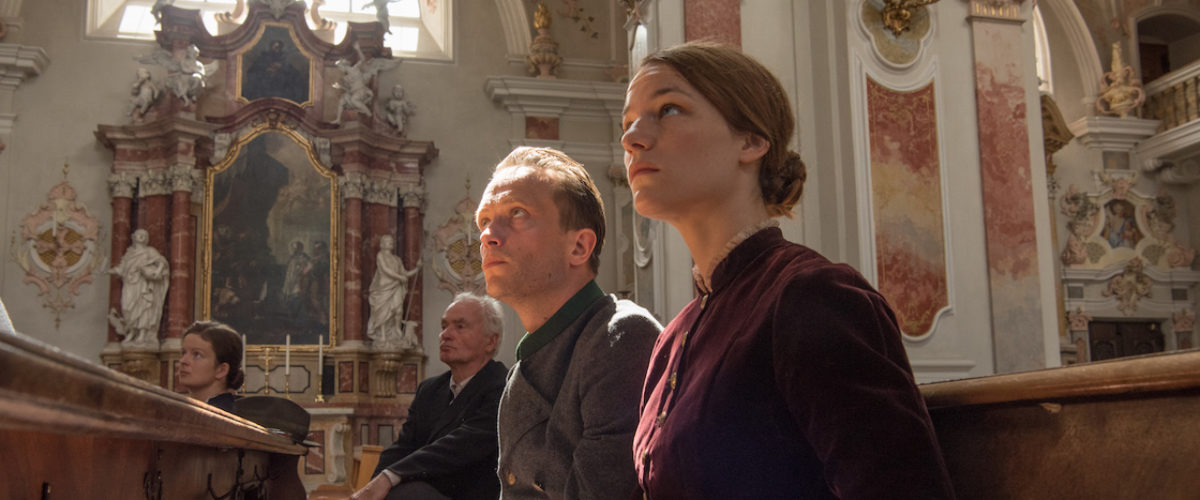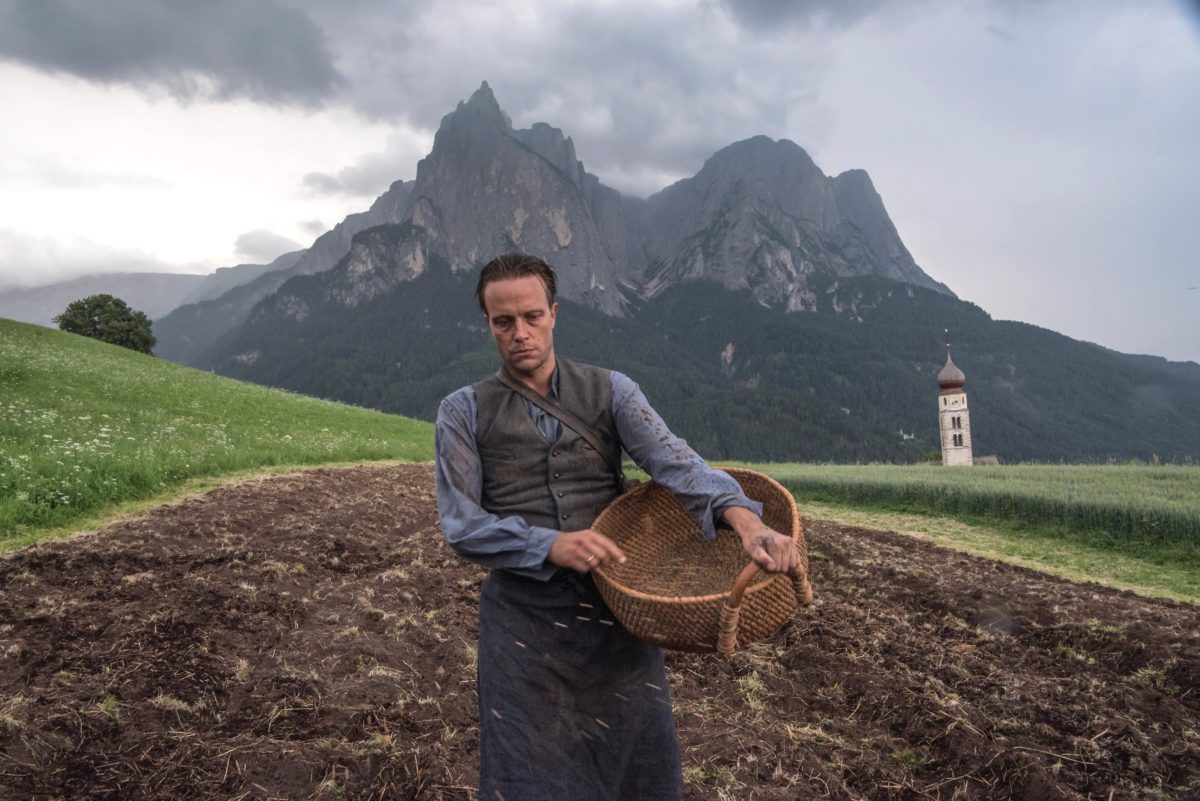Diejenigen, die in es eintreten, erkennen
sich, denn sie sind dann wie Funken, aufglimmend
zu hellerem Leuchten, verschwindend bis
zur Unsichtbarkeit, wechselnd in ständiger Bewegung.
Die Funken sehen sich, und jeder
flammt heller, weil er andere sieht.
Hannah Arendt — Laudatio auf Karl Japsers
0. On Trains, Once More
One year to date before my viewing of A Hidden Life I was sitting in the silent train car serpentining through what I later found out to be the Alps as I was on my way to Vienna to visit D., who would become one of my closest friends but at the moment was just someone who agreed to host me for a few nights on the first stop of what would become my big European tour of self discovery. Since I might have some talents but an intuitive understanding of geography is definitely not one of them, I asked myself the question if the majestic masses of earth outside my window were really mountains or if I was just a Belgian? Coming from a small country has its disadvantages but this is not the time to write about those. The main advantage it has is the agility with which you are able to relate to your own history without being held down by the scale of it, something which seems to be more difficult when coming from a country like France or Germany with all the history they drag behind them. Enchanted by what I saw I put away the copy of Stefan Zweig’s The World of Yesterday—yes I am that kind of traveler—and gazed upon the snow covered slopes and valleys over which the sun was setting, and when the last rays of light set on fire the clouds of snow that were thrown up by the train that carried me I exclaimed with the Newtonian enthusiasm of someone embarking on what feels like a life changing journey: “I understand Heidegger now.”
I. The Nearness of the Distant
Why is there something instead of nothing? It could have been one of those many sentences uttered in the voice-overs that have become a trademark of Terrence Malick’s cinema ever since, well, the beginning of his inquiry into the phenomenology of landscapes and emotions channeled through the bodily vessels that wander through his cinematic appraisal of nature. Of all the flaws that have been attributed to his output of the last decade, most of which I understand but disagree with, the most mystifying for me has been the one of esotericism. It seems that we have forgotten to read images that dare not speak of psychology, just like we lost sight of the lines we once imagined between the stars back when we, as John Berger wrote, constructed the first narratives and thus identities in the history of these animals that we call humans. Terrence Malick is a landscape painter in the tradition of all those painters that knew asking what it means to be human had to be done inside the world they were inhabiting.
These, of course, are very Romantic notions. The kind of Romanticism that sure has proven to be dangerous, especially in the era Terrence Malick’s A Hidden Life is set in. The wondering exclamation “Why is there something instead of nothing?” is also the question which Heidegger pinpointed as the ultimate inquiry of metaphysics, a question that has been asked throughout the whole of human history, possibly even all the way back to those first humans drawing lines between those little lights and whatever they represented for them. It is a question one can only ask oneself after the fall out of Eden, once you are no longer part of the nature you inhabit. It is a question of purpose, of doubt and of longing, which means it is a question that can only be asked by a being that has fallen from paradise. It is unthinkable for Adam and Eve to have come up with this sentence.
Falling from paradise can mean many things. The reason why The Tree of Life has been voted many times to be the greatest movie of the last decade is because it had the audacious ambition to clearly connect the fall from grace with the questioning of existence. The expulsion from paradise by the loss of a son, a brother, a child—something I have to say I have the luck of not being existentially familiar with—sets off the film’s inquiry into the creation of existence to the tune of the Bible’s most existentialist verses out of the Book of Job. “Why is this happening to me?” is asking why is there something instead of nothing. It means specifically pondering the seemingly opposing forces of grace and nature, the Leidmotiv of Malick’s poems, embodied respectively by the mother and the father.
If longing is the agony of the nearness of the distant (and if this is Heidegger or Malick, I’ll let Google tell you) then grace is the way we can rise up to the challenge proposed by our estrangement from nature. Grace being a concept that is difficult to define, or even get a glimpse off, what the cinema of Malick has attempted to show is grace as the intuitive knowledge that there are bigger things than we must even attempt to understand. This knowledge is something we must surrender to or, as Franz Jägerstätter shows us, must fight to protect at all costs.

II. The Beauty is the Point
Those who claim there are too many images of landscapes in A Hidden Life might as well claim there too many mountains in Germany or too many trees in the Schwarzwald; they do not understand what is happening. Sometimes things are simple. The Edenlike pastoral beauty of the surroundings of the Austrian town of Radegund are the backbone of the fascist ideology and its perverse obsession with a mythological purity. These hills truly are alive with the songs they have sung, clean and bright, for a thousand years. But before we are introduced to die heiligen Bergen we are introduced to their symbolic destruction by archival footage of a man who did not become famous by the paintings he made of them. Cinema and trains are the symbiotic duo that ushered in modernism by the obliteration of a human understanding of time and space, at the same time ironically, because at a distance, reinventing whatever it is we lost in the fire as something that was pure. Every paradise is only created on the threshold of expulsion; as the reverse image of the door in Kafka’s Before the Law, it is there only for us but can only remind us of a place we can never go back again.
Cinema and trains, the pollution of a time and space that were never pure to begin with. But the idyllic idea of a once upon a time harmonic living inside nature has a strong pull and has permeated a lot of utopian thinking, just as the possibility of the complete (cultural) control of the city landscape has been the locale of most dystopian fiction. Both are based on the illusionary premise that city and countryside, culture and nature have meaning without each other and thus can exist without each other. It has been the proliferation of the impure and dirty cities that made the countryside an ideal of purity. And this is why A Hidden Life shows us these archival images at the start, because what follows will not have the same meaning if we do not look at it from the perspective of its simultaneous destruction and creation.
Which finally brings us to our hero of the golden hour. First seen against the backdrop of the mountains while tending to his fields in a tender union with his wife, the embodiment of the archetypical imagining of the children of Eden. They swirl and frolic in the grass whenever the opportunity arises until the end of their world announces itself through the ominous sounds of airplanes. (In Song to Song the theme of the devil was also announced by the roaring of a motor.) It seems as if the airplanes come out of nowhere, like thunder in a clear sky, history intruding into the pastoral days of yore. However historically untrue this may be, the stakes are set, what will have been can be no more.
III. The Tree of Good and Evil
Doubt is the motor of change. Radegund loses its childlike innocence. David Leavitt once said in an interview that there are two basic stories; a man leaves his village and embarks on an adventure or a man arrives in the town and catalyzes an adventure in the town itself. Of course, these are the same story from a different perspective. With the adventure of a stranger who arrives and usurps a neighboring country the once so familiar mountains start to change too. The mist that hangs over them obscures what was once clear and forces the inhabitants of Radegund to search for their place in this world that has become unfamiliar. Out of nowhere the mayor of this hidden hamlet in the mountains, where quite possibly a stranger hasn’t been sighted for as long as the town can remember, starts ranting about foreigners that will bring down this great nation of which he believes himself to be part.
One of the great insights of Sunset Song, the latest film of that other great Ter(r)ence of cinema—wherein, for the first time, he brings a kindred sensibility to the spaciousness of the Scottish highlands, albeit bred in and attuned to the streets and chambers of Liverpool’s working class—is that nationalism for a lot of people in the countryside meant nothing more than the defense of that part of the earth that was visible to and known by them. It was a very concrete nationalism, a passionate plea against an imagined threat of hearsay. The same could be said for the villagers of Radegund. It could be almost comical were it not for the bigger story by which it is overshadowed.
Our hero’s quest starts when he is forced to compose himself an answer to the unabashed glee with which his fellow villagers seem to surrender themselves to a hate that was barely imaginable a few days earlier. The child becomes a person as soon as it sees how fallible its parents are. In this moment he receives the knowledge of good and evil, because for the first time he is set apart from his surroundings by the disturbance of the as paradisiacal as it is prosaic monotony of life on the rhythm of the seasons. He must rise to the occasion to grasp his full humanity.
He starts looking for answers, talking to his neighbors trying to make sense of what is happening and when met by deaf ears reaching higher for the priest who shows himself to be not much of a shepherd as he lets himself be dictated by his flock, and even higher climbing the ranks of the papal structures, but always to no avail whatsoever. Truly alone, he is left to his own moral judgment when finally the storm that had been gathering over the mountains for some time materializes into the bureaucratic language that orders him to enlist in the German army. Forced to swear an oath of loyalty to the by now ex-painter Adolf Hitler, he refuses and embarks on his revolution of one, convinced as he is that there are more important things to preserve by his actions than his own life.

IV. The Best Thing the Future Can Be
Jägerstätter is imprisoned for his conscientious objection and tortured for the rest of his lifetime. Not unlike was the case of a certain Jewish-Italian chemist and soon-to-be writer, who much in the same way might have lived in perfect harmony with his surroundings only to be cut off from them by this war, the main method of torture is the assurance that no one will ever hear of the atrocities brought upon him. The fruitlessness of his position is underlined by the prospect of a future wherein no one will hear about him, or even worse, will have no reason to understand this waste of his life. It is the privilege of power to prescribe the future that gives the present meaning. If the Germans win the war, his sacrifice will have been for nothing. Or so they claim.
Because, as a famous diary entry by Virginia Woolf has it, the future is dark, which is the best way the future can be. Nobody knows what can happen and everything that seems impossible has just not happened yet. Power on the rise will never be able to imagine its own demise and it is in the margins that most ideas that will shape the future are born. Since the future is dark it is more important than ever the guard the light, as Jägerstätter calls it himself, even if he himself might not be there to “see the dawn after this long night” (as Zweig put it in his suicide note). By refusing to bow down to a situation that destroys everything he believes in, Jägerstätter is safeguarding the possibility of a humanity after the apocalypse, a light by which to recognize the hope of a new day on the horizon.
When Jägerstätter is first brought to one of the many prisons he will rot away in, the camera makes one of Malick’s characteristic sweeping movements upward in exactly the same manner it did when Jägerstätter entered the church he visited in hopes of finding answers to the questions that besieged him during this dark night of the soul. What is implied here is that even this prison can be church when sanctioned by the aspirations of faith. Even in a hopeless place, it is possible to find friendship and thus love, to rise above the seemingly concrete conditions of the present and keep believing in God, which means keep believing in what humans could be instead of what they are most of the time.
In the end faith was not enough, as it probably always will be a necessary but insufficient condition. But Jägerstätter is not forgotten. The letters he sent his wife and the stories that survived him are the traces of a life lived hidden by the present but reinstated by the future. It shows us that moral behavior is possible even when all paradises seem to be lost and the end of the world is near. One of the most beautiful sentences in the western philosophical canon is one by Wittgenstein when he says that religious feelings are rooted in the experience of the world as a wonder. This wonder cannot be expressed through language but is expressed by the existence of language, since only man, who fell from paradise has been equipped with it. The conclusion of this could be that man is privileged precisely because he has been thrown out of paradise, the privilege of the margin wherein he can use the word (that was in the beginning) to imagine a God that created him to his own liking. But with this great privilege of course comes the great duty of preserving the experience of the world as wonder. It is this duty of which the story of Jägerstätter reminds us by holding up for us a light in the dark room of the present.
